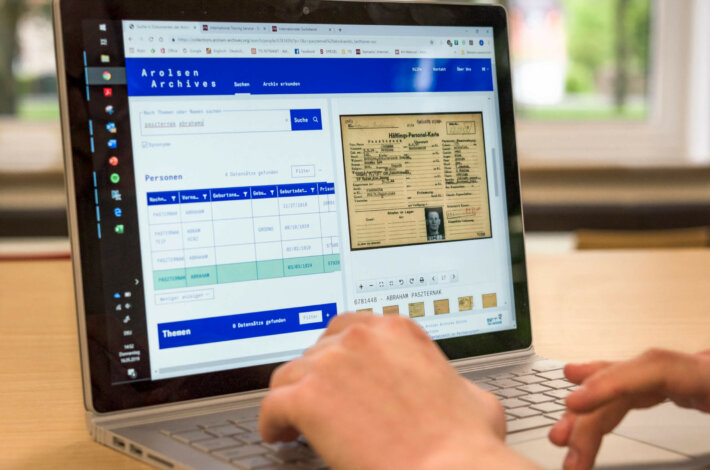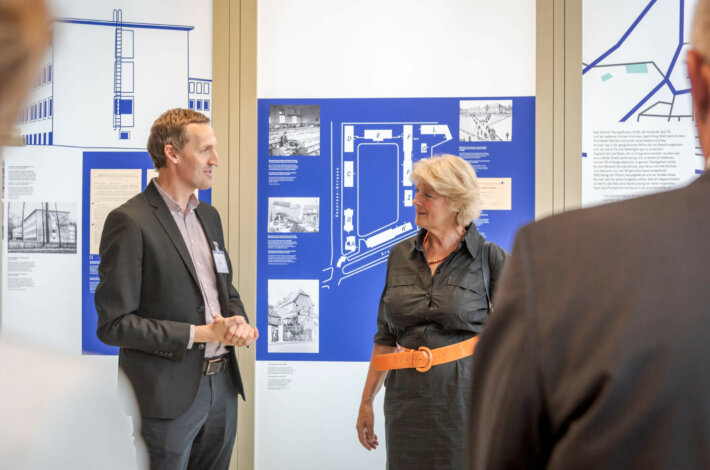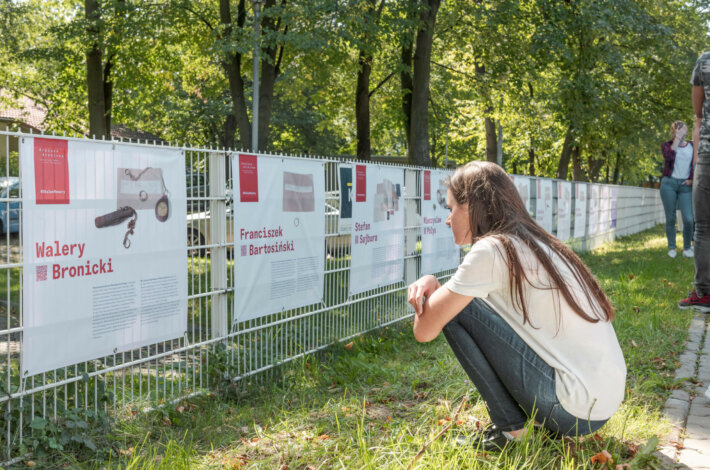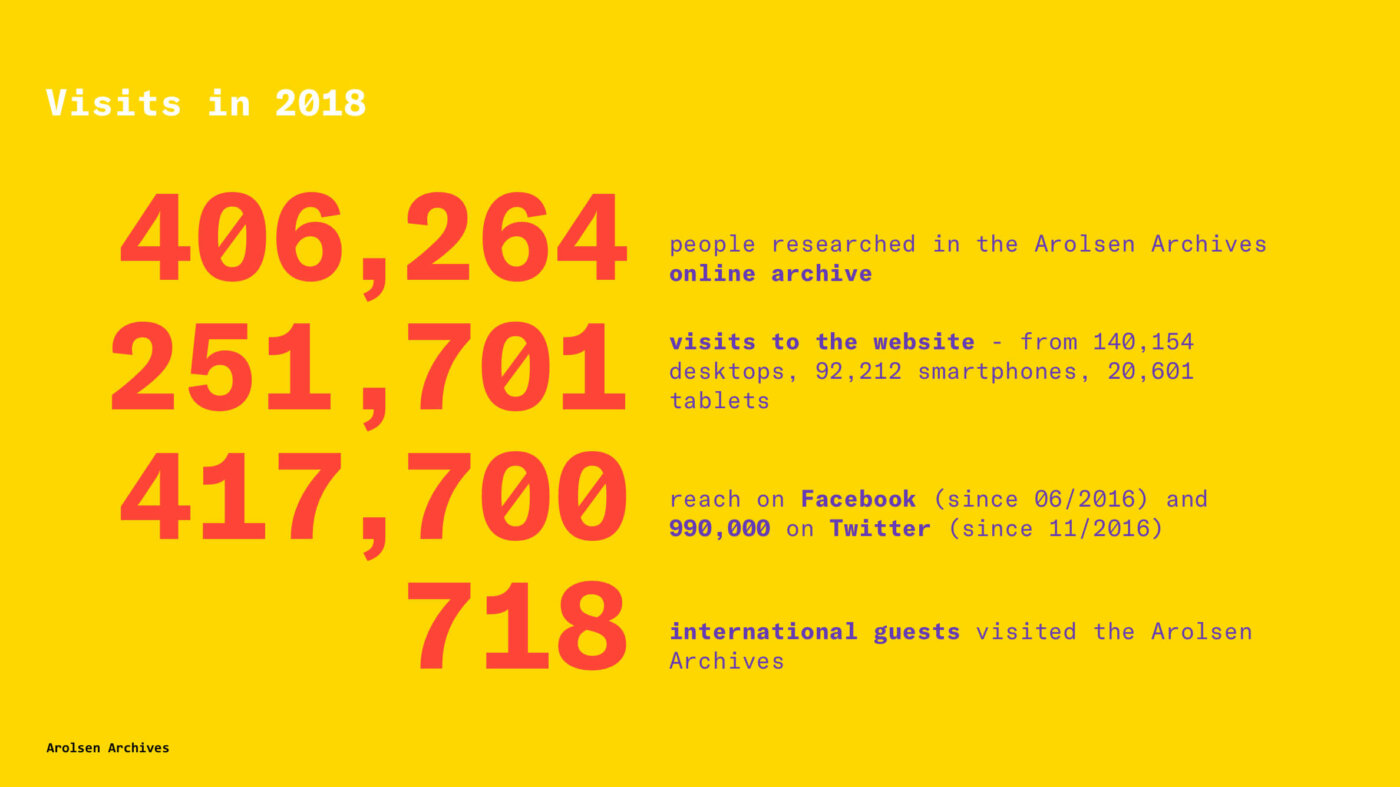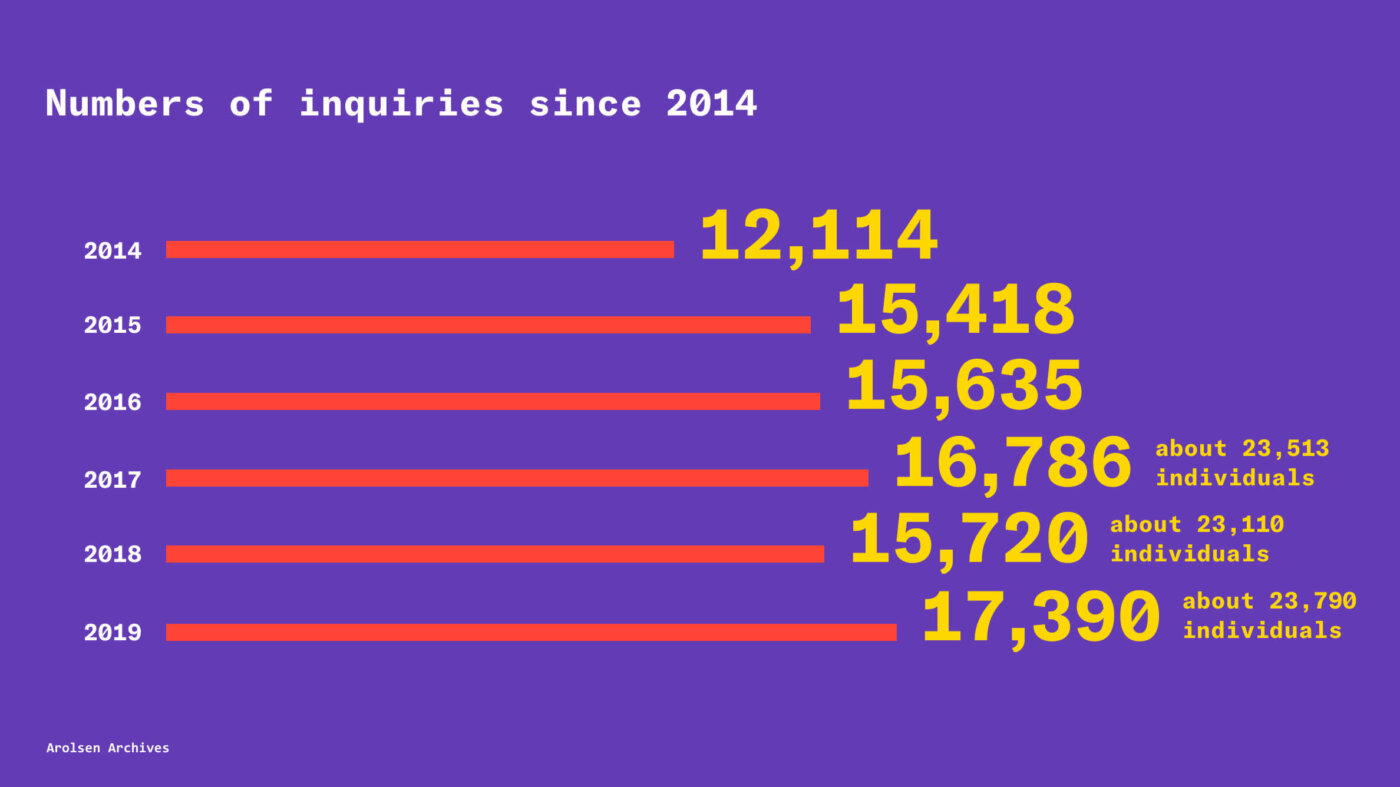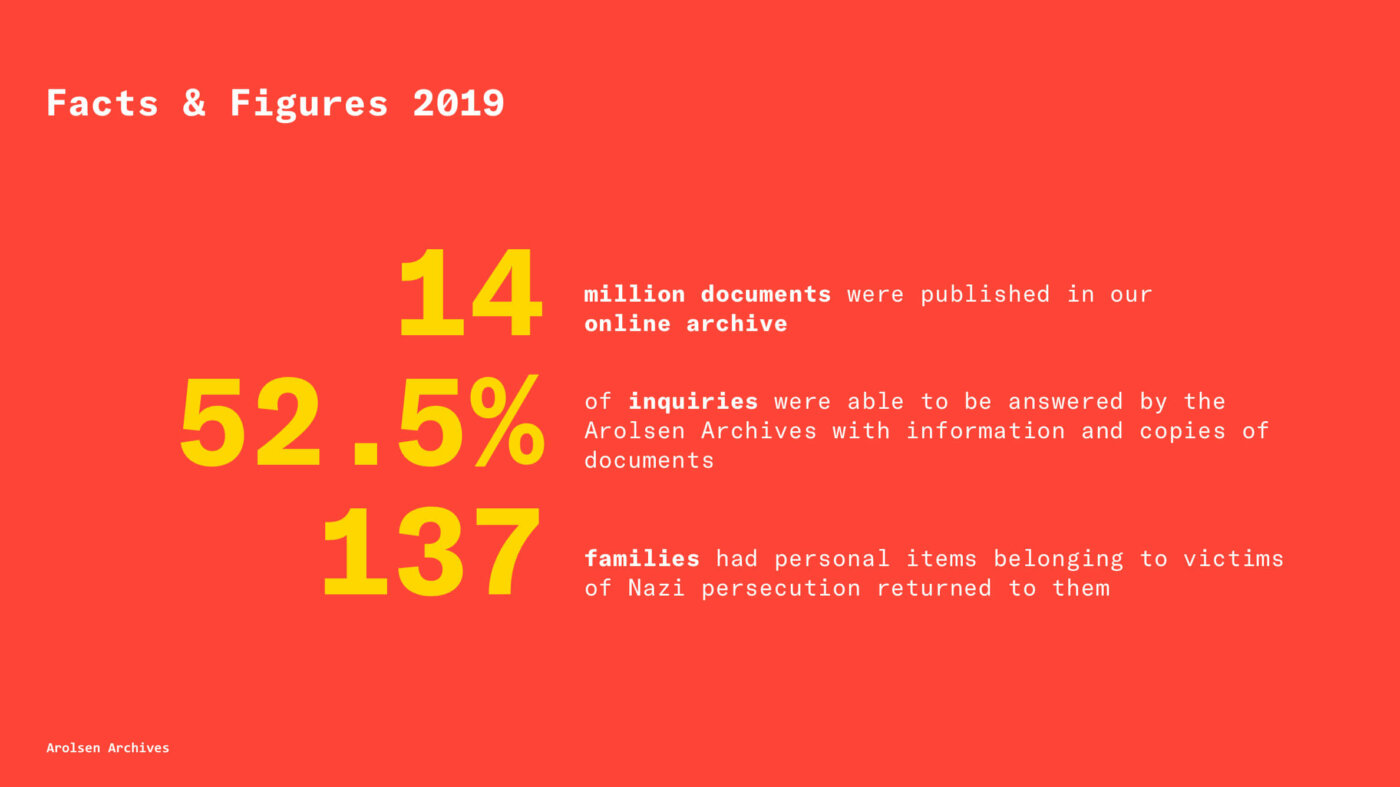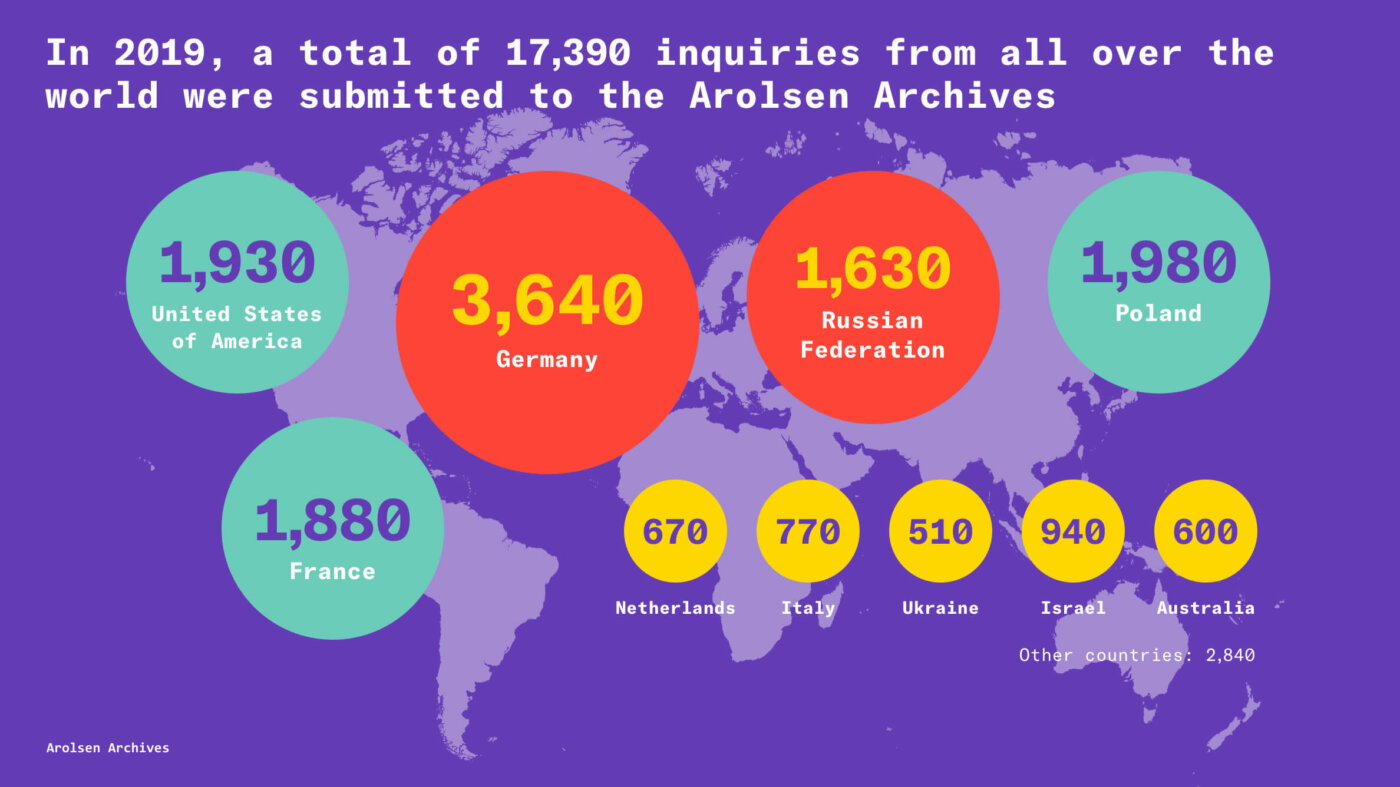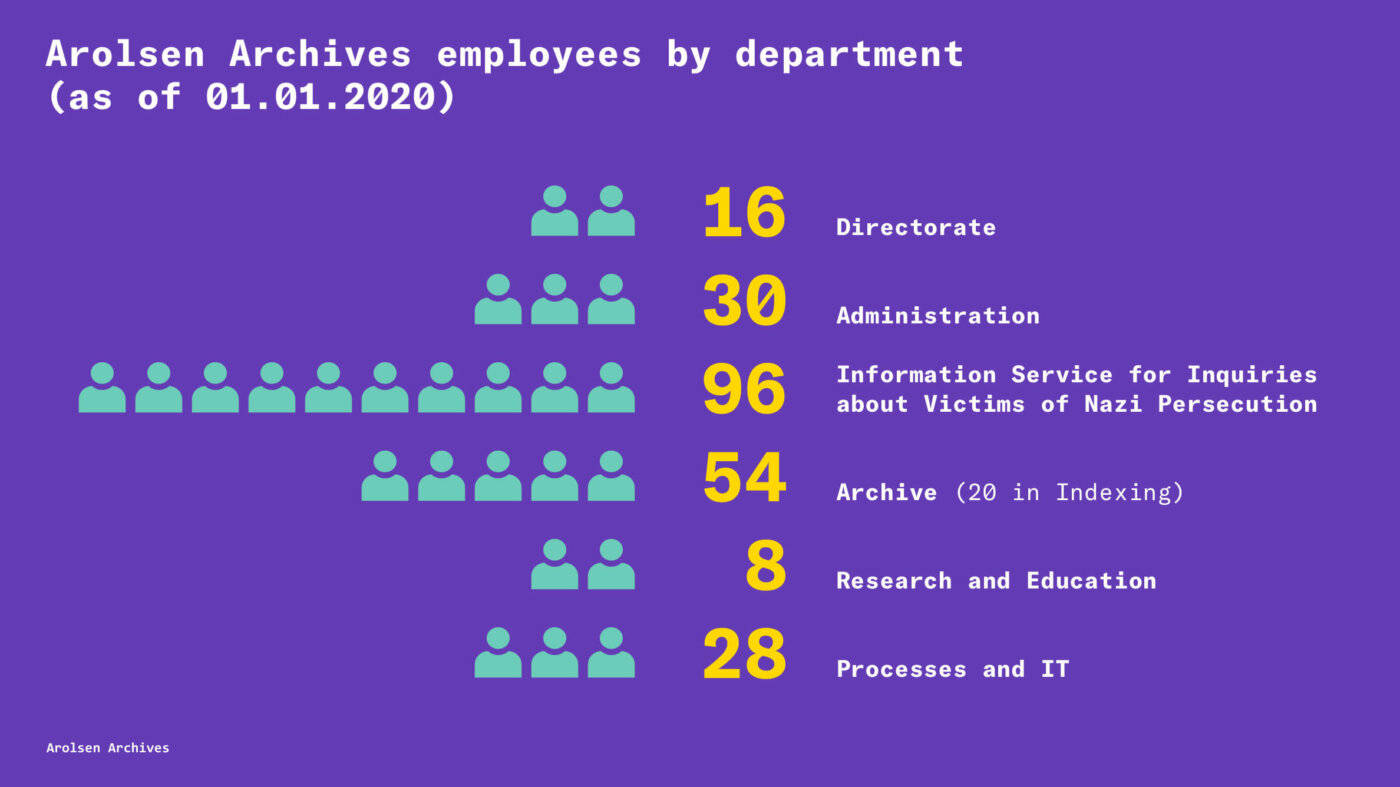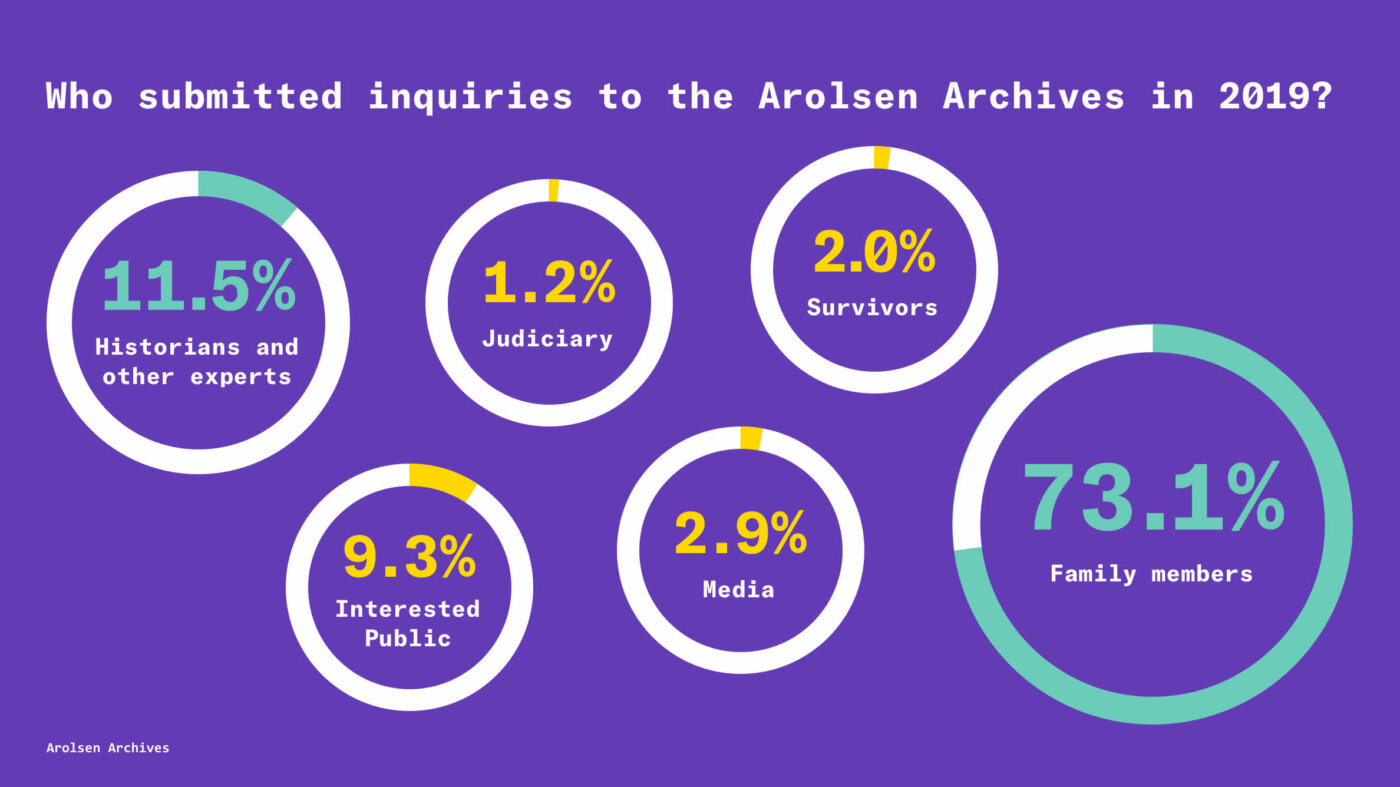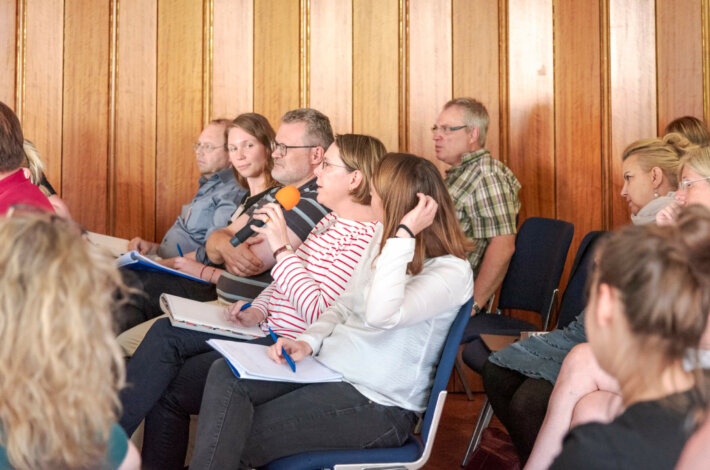2019 was a year of many milestones. Working in partnership with our international partners, our employees have implemented more projects than ever before – including the online archive, which has received so much attention worldwide, numerous #StolenMemory exhibitions throughout Europe, and our own first permanent exhibition. We are now a living archive that is reaching out to young internet users all over the world. And we are using our historical documents to build a monument – one that stands for truth in the face of historical repression and fake news.
Floriane Azoulay,

Foreword - Relaunch into the Future
Right-wing ideologies pose a threat to freedom
2019 was also a year that showed us how important it is to remember the crimes committed under National Socialism. It was a difficult year for democracy and mutual tolerance. The attacks in Halle and Christchurch, the successes of right-wing and anti-democratic parties all around the world, the record high reported for right-wing extremist crimes here in Germany, and finally, the murder of the President of the District of Kassel almost right on our doorstep: Right-wing ideologies have evidently become acceptable once more. They pose a threat to the freedom of our society, and they have led to right-wing terror on a number of occasions in the recent past.
Let the documents speak as witnesses
Historical denialism, historical amnesia, and ignorance are some of the underlying causes of this dangerous trend. As the world's most comprehensive archive on Nazi persecutees, it is therefore our duty to expand the educational work we do on the fates of the victims. We want to let the documents in our archive “speak” as witnesses. They are a constant reminder of how racist slogans and nationalist madness led to a break with civilization that resulted in the death and persecution of millions of people. We want to take a firm stand and help shape political debate.
A new focus on young people
This overriding aim was the driving force behind all the projects and activities we undertook in 2019 - first and foremost, of course, it was the reason behind our new name. We are now the “Arolsen Archives – International Center on Nazi Persecution.” This name has an authentic history behind it, it refers to our core mission, it is easy to remember, and it reflects our internationality. It underlines our new focus on a young, global target audience whose members have not had any direct experience of Nazi persecution and the Holocaust themselves. We are reaching out to these “digital natives” with easy-to-use internet offerings like our new online archive. By the end of 2019, more than 350 000 users had already searched for information in the millions of documents available there. We owe this success to a groundbreaking partnership: The portal is based on the state-of-the-art technology and the unique database for advanced place and name search developed by our partner Yad Vashem.
Moving ahead with strong partners at our side
Putting millions of documents online, making them searchable, providing contextual information so that they can be understood, and using them to create a “digital monument”: These tasks will occupy us for years to come. Because there is so much to do, we need strong partners at our side. Towards the end of 2019, Ancestry, the world's largest genealogy platform, gave us a tremendous amount of support once again by helping us to index documents and put them online. Of course, it is also due to the dedication shown by our employees that we have managed to make such good progress this year. In 2019, we recruited young specialists in IT, historical research, education, communication, archiving, and indexing. They worked in partnership with our experienced, long-serving staff and together they have achieved a great deal.
Exhibitions all over Europe
I would also like to highlight our first permanent exhibition, which is a very important milestone and now takes visitors to Bad Arolsen on a colorful, interactive journey through the history of the institution. Another aspect of our work that I am particularly proud of are all the #StolenMemory exhibitions that we have been able to hold in various European countries during 2019. They help us to find even more relatives of the former concentration camp inmates whose personal belongings are stored in our archives – especially in Poland where we put on four separate exhibitions. A particularly large number of people there were affected by Nazi persecution. The following generations are now very interested in coming to terms with the fates suffered by their relatives. In 2019, we received inquiries on almost 24 000 people once again – over 70 percent of them came from members of victims’ families.
I look forward to working together with my colleagues to continue our new educational and informational programs and to see us gradually reaching an even wider audience!
Rebranding
A New Name – A New Mission
The underlying aim is to increase our involvement in social debate on antisemitism, discrimination, and racism. And to develop new ways of communicating history: The Arolsen Archives have been more than “just” the most comprehensive archive on Nazi persecution for many years now. “Today, we see ourselves as an international documentation center which fulfils an important role in education and research,” explains the organization’s Director, Floriane Azoulay. “We want use a wide variety of communication strategies to help keep the memory of the victims of the Nazi regime alive, and we want to reach out to young people by providing modern educational resources.”
Many new tasks have been added
This made it high time to think about a brand new corporate image for the organization – in addition to a new name. The name chosen by the Allies, “International Tracing Service,” described the original mission that we still fulfil today: clarifying the fates of the victims of National Socialist crimes. However, it did not reflect many of the new tasks and new projects that we have been involved in over the past ten years.
“We also often found that the historical name didn’t mean anything to people and was not very memorable,” commented Floriane Azoulay as she explained the rationale for the change of name. An important argument in favor of the new name is the fact that survivors of Nazi persecution and their families in Israel and the USA have always referred to the institution as "Arolsen”: Arolsen Archives – International Center on Nazi Persecution.
An open institution with a digital future
However, rebranding is much more than just a new name. As well as launching a new website, we have also completely redesigned the way the organization presents itself. The ultimate aim of all these measures was to give expression to our new identity – as an authentic, empathetic, open institution with a digital future. Together with our international partners, many employees spent months working on the website, developing the new logo, designing flyers and information brochures, organizing events, and adding millions of documents to the new, user-friendly online archive. They were all working toward the same goal: To create a modern, future-oriented organization that helps young people all over the world to come to a better understanding of what happened to the victims of National Socialist persecution.
Every Name Counts
Facts and Figures
Interview
Working Against Time
Only in the rarest of cases do actual survivors of Nazi persecution inquire with the Arolsen Archives about documents pertaining to their past. Most inquiries come to us from the descendants—the victims’ children, grandchildren, often even their great-grandchildren. What are they looking for? How do they react to new information about their relative’s fate? And why is it so important to process their inquiries as quickly as possible? A conversation with Anna Meier-Osinski, the head of the tracing department, about inquiries from the generations that came after.
Why are the descendants of the persecution victims still interested in their relatives’ fates? Hasn’t every story already long been told?
No, and already the documents in our archive are clear evidence of that fact. We have information on more than 17.5 million individuals. To date, we’ve received inquiries about 3 million of them. So there are still a lot of unanswered questions, even taking into account that often entire families were murdered and there’s accordingly no one to search for them. In 2019 we received 16,000 inquiries from members of the later generations. Especially in Eastern Europe and Russia, there are still millions of families who don’t know what happened to their relatives. Nearly every family in Poland was subjected to Nazi persecution. Children and grandchildren are now looking for answers to questions their parents or grandparents never had a chance to ask.
How do people looking for information find their way to the Arolsen Archives?
Many of the survivors never talked to their families about their fates. But they did often try to obtain confirmation of imprisonment so they could receive compensation. The Arolsen Archives and its predecessor institutions issued documents of that kind from 1945 onward. When the children or grandchildren find something like that in the person’s belongings after his or her death, they inquire with us and want to know what it’s all about. And many people also start doing research on their relatives’ fates on their own—in cases where maybe all they know is the name and that the person was deported by the Nazis. Institutions all over the world refer these people to us. Or people come across the Arolsen Archives in the course of their own internet research. Major genealogy platforms such as Ancestry and My Heritage also make reference to us.
What can the inquirers learn about their relatives here?
They’re often amazed at the wealth of information we keep here. Sometimes we can even reconstruct the entire history of a person’s persecution. Often, though, it’s just certain stages of that history. But even that is important if you know very little. The descendants often learn to see their relatives in a whole new way. Sometimes families find the certainty they’ve been looking for for decades. In 2019 we had an especially tragic case of a Polish family who suspected for a long time that their deported grandfather had started a new life for himself in Germany. His wife and son took those doubts with them to their graves. It was the granddaughter who finally learned from us that the man had been murdered in a horrible Nazi massacre. She was able to visit his gravesite in Saxony-Anhalt. That story shows to what extent we’re working against time when we process these inquiries. A few years earlier, we could have reached his wife and son.
Are all of the families looking for documents, or do some of them also have other questions?
There are also those that are looking for a family member—a half-sibling or cousin, for example, or a more distant relative. Hundreds of thousands of families were torn apart by the Nazi crimes. Sometimes it takes until now for families to learn that someone among them survived. We also help in these cases. And we can assist in the search for gravesites, for example of forced laborers or concentration camp inmates.
What happens after a case is clarified?
For many of the inquirers, our documentation is just the first step. They continue their research based on the new leads they’ve gotten from us. Families also come to Bad Arolsen to view the original documents, because often these documents are the last trace of their relatives. People take long journeys upon themselves for this purpose, for example from the USA or Australia. Often they also visit memorials that have been established on the sites of former concentration camps. And they bring their children with them. The whole family talks about the fate the relative suffered under the Nazis, and so the story gets passed on to the younger generation. In many cases these are families that long thought they weren’t affected by the events or didn’t believe they could ever find anything out.
How do the many inquiries from the later generations change the work of the Arolsen Archives? How do these inquiries differ from those that used to come from the victims themselves?
In the post-war period, the survivors were trying to get compensation. To them it was important to obtain confirmation of their imprisonment. You didn’t have to explain to those people what a concentration camp was or what forced labor meant, because they knew from personal experience. With their descendants, the situation varies. These days, the majority of the inquiries come from Poland, Russia, the USA, Australia, France, and Israel. The way people are socialized in these countries is very different, and people have different levels of knowledge about how the Second World War played out in Europe. In Australia, for example, there’s a lot of interest in genealogy, but very little knowledge about that period in history. And very few people know about the concentration camps in any detail.
So does that mean we have to enlighten people more?
Yes, exactly. The document is “merely” the key to the past the inquirers want to learn about. The document tells a person that his or her grandfather was imprisoned in the Dachau concentration camp from 1942 to 1944. But the grandchildren want to know what that meant in practice. What was his everyday life in the camp like, what kind of labor did he have to perform, what did they give him to eat? The person’s experience and fate only become clear through context information, which we now supply along with the document copies. With the aid of new digital offers such as our eGuide, people can decipher the documents themselves. Over the coming years we plan to greatly expand these kinds of possibilities.
Anna Meier-Osinski was the head of the tracing department until early 2020. Since February 2020 she has been the outreach manager for Eastern and Central Europe (Poland) [JR1] and is working to establish a branch of the Arolsen Archives in Warsaw.

